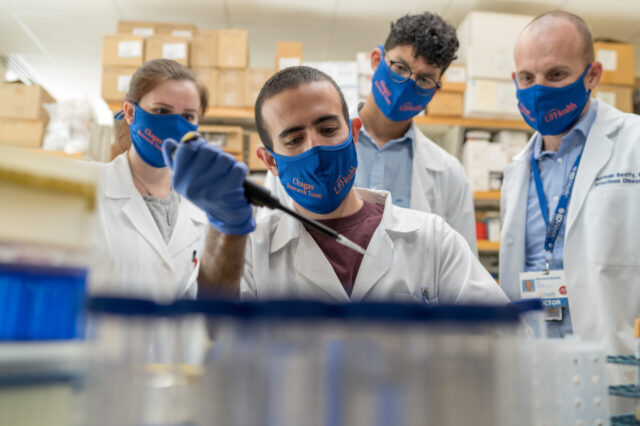UF Health scientists study prevalence of a kissing bug disease among Latin Americans in Florida

It isn’t the “kiss” that sickens. The parasite that can slowly kill lurks in the feces, and not the bite, of the triatomine insect, commonly called the kissing bug.
The illness the kissing bug transmits is called Chagas disease, which is endemic to Latin America. An estimated 7 million people carry the disease, with most of those asymptomatic and unaware they are infected with the chronic illness. About 300,000 people in the United States are thought to be infected.
A University of Florida Health researcher is now leading what is thought to be the first effort to measure the prevalence of Chagas disease in Florida’s Latin American community, an effort that is hoped will bring more awareness of the disease that is mostly unknown in the U.S. even among some physicians.
“We want to educate on the importance of screening for Chagas disease because it can be fatal,” said Norman Beatty, M.D., a UF Health infectious disease specialist who is leading the prevalence study. “The fear is that patients would go without a diagnosis until it is too late.”
In collaboration with several UF Health clinics, including the UF Equal Access Clinic Network and the UF Mobile Outreach Clinic, Latin Americans at-risk for Chagas disease will be given the option of receiving two rapid diagnostic tests for the disease using a finger-prick blood draw.
“We’ll have an answer for them during the encounter,” Beatty said. Results are returned in about 20 minutes.
A bigger blood sample will also be taken for serological testing looking for antibodies created against the parasite, which is called Trypanosoma cruzi. Further molecular testing looking for the parasite’s DNA will be done with more advanced testing.
Additionally, a health screening will be conducted. One of Beatty’s goals is to see if those who are infected have higher rates of other comorbidities such as diabetes and high blood pressure compared with people who are uninfected.
The kissing bug’s name is something of a misnomer. Bite marks can sometimes be found on the face, where the kissing bug takes a blood meal while someone sleeps, hence the derivation of the name.
“Some of the studies I’ve done actually show that people are bitten more commonly on the arms and the legs under the covers,” Beatty said.
In any case, the bite doesn’t spread the disease-bearing parasite. Instead, the feces of the bug, which carries the parasite that causes Chagas disease, can be rubbed into a bite site or even ingested through the environment, especially in contaminated food or fruit juices.
Death often comes through heart complications, including congestive heart failure. Serious gastrointestinal problems also can occur.
Increased awareness is of critical importance in the United States since most people will not exhibit any symptoms of Chagas disease when they are infected. A minority of people experience fatigue, fever, body aches, among other symptoms, in the first few weeks of the disease that they might easily pass off as the flu or other less severe illness.
But the symptoms dissipate even as the parasite remains hard at work for decades, eventually triggering chronic inflammation in the tissues it targets, such as the heart and gastrointestinal tract.
If patients and medical practitioners are unaware of the disease, diagnosis can be delayed many years until the infection is so advanced that the odds of survival are diminished.
Beatty, an assistant professor in the UF College of Medicine’s division of infectious diseases and global medicine, said fewer than 1% of the 300,000 people in the U.S. infected by Chagas disease have been diagnosed.
While triatomine insects are found in Florida and throughout the southern half of the United States, locally acquired Chagas disease in the U.S. is thought to be a rare occurrence, with approximately 78 cases nationally described in the literature. But Beatty said we know very little about how people are infected in the U.S.
Beatty has enough funding to screen 500 people initially, but he hopes to greatly expand that as more money becomes available. Scientists believe 18,000 people in Florida have Chagas disease, but there is much uncertainty in that number. Florida trails only California and Texas in total estimated cases.
“I would suggest it is likely that this disease is significantly underrepresented,” Beatty said.
If caught early enough, the disease can be treated using antiparasitic medications. In advanced cases, heart transplantation might be the only option. Beatty said 30% to 40% of those infected can go on to develop chronic illness.
Rodrigo F. Alcala Arana, a recent UF graduate who is Beatty’s research coordinator and a native of Venezuela, said South Americans are especially fearful of Chagas disease. He said one of his uncles died at age 60 from heart problems caused by the infection.
“People know the bug is dangerous,” said Alcala Arana, who earned a degree in microbiology and cell science. “My family was very afraid of Chagas disease. We tried to pray to avoid things like that. Since it’s really not known here, people don’t really check for it often or thoroughly.”
Beatty has received funding for his project from Mundo Sano, an international nonprofit focused on the prevention of tropical diseases. He also said Rhoel Dinglasan, Ph.D., M.P.H., M.Phil., a professor in the UF College of Veterinary Medicine’s department of infectious diseases and immunology and the UF Emerging Pathogens Institute, provided the project with important support.
One interesting piece of trivia about the kissing bug. Its bite is typically not painful. That’s because it injects an anesthetic as it takes its blood meal.
The pain comes later.
Media contact: Ken Garcia at kdgarcia@ufl.edu or 352-273-9799.
About the author
